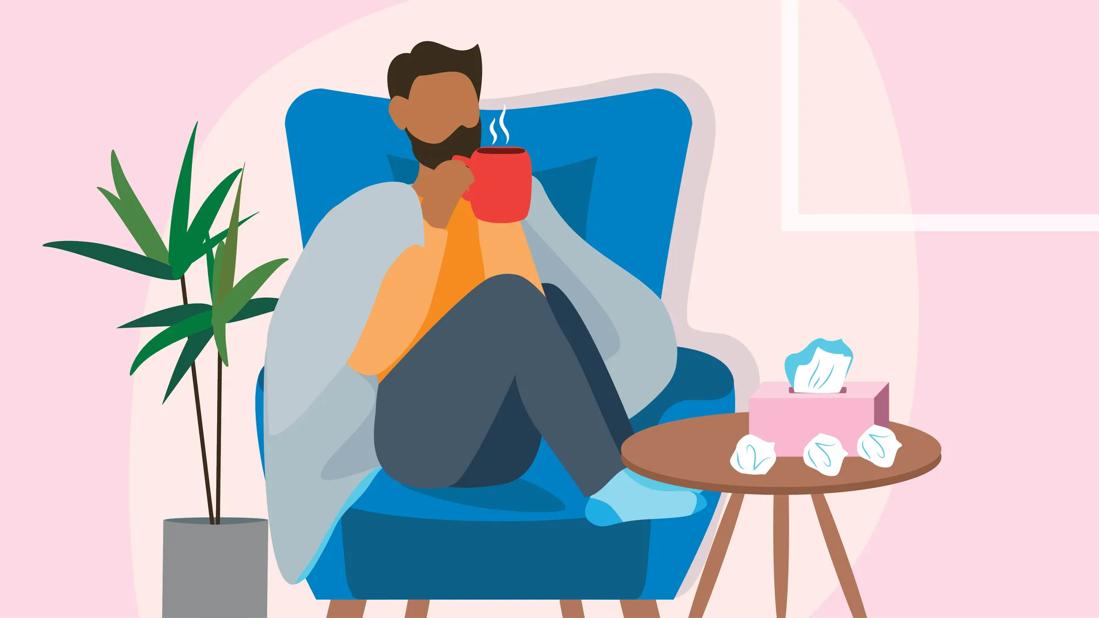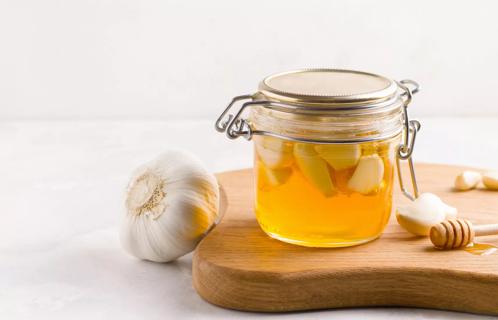You can’t cure a cold, but these simple home remedies can help you feel better faster

When a cold hits, all you want is relief from the stuffiness, the sniffly-ness, the make-it-go-away-ness.
Advertisement
Cleveland Clinic is a non-profit academic medical center. Advertising on our site helps support our mission. We do not endorse non-Cleveland Clinic products or services. Policy
Unfortunately, colds are caused by a virus. And while there’s no magic cure for viral illness, the right home remedies can help relieve your symptoms so you can feel more like you.
We asked family medicine physician Neha Vyas, MD, to break down the best common cold treatments — as well as some remedies to avoid.
When you have a cold, you can take steps to feel better faster, like getting plenty of rest, drinking lots of fluids and breaking up mucus with steam to soothe your symptoms.
Check out Dr. Vyas’ top eight at-home treatments for a cold.
One of the best things you can do for a cold? Take it easy.
“When you rest and sleep, it allows your immune system to recharge,” Dr. Vyas says.
Rest is a critical part of common cold treatment because it allows your body to focus on getting better, rather than working to keep up with the hustle and bustle of the day. “When you allow your body to rest, your immune system can do its job and help you fight the infection naturally,” she adds.
If you feel up for light exercise at home, that’s OK — just don’t push yourself too hard. This isn’t the time to power through a grueling workout.
Hydration is a cornerstone of common cold self-care. When you’re sick, you tend to lose more fluids. That’s especially true if you’re running a fever.
Advertisement
Water is one way to do it. But you can also try low-sodium broth and warm tea (with honey for maximum symptom relief). Warm drinks can also help thin mucus and soothe a sore throat.
If you’re congested or dealing with a dry throat, a humidifier can help. So can a steamy shower.
“When you put yourself in a warm, moist environment, it helps mucus loosen up so you can breathe better,” says Dr. Vyas.
Just be sure to clean your humidifier daily to prevent mold or bacteria from building up. A dirty humidifier can spew spores into the air and make your symptoms worse.
A saltwater gargle can provide temporary relief for a sore throat.
Why? The salt in the mixture helps draw water out of the tissue in your throat and helps soothe inflammation. It can also help to loosen up any mucus that might be hanging around.
Here’s how:
Stir 1/2 teaspoon of salt into 8 ounces of room temperature water. Gargle some of the water in the back of your throat, then swish it around in your mouth. And then be sure to spit the water out — don’t swallow it.
A neti pot can offer relief by flushing mucus and allergens out of your nasal cavity. But there’s a right way to do it. Follow these tips:
Menthol has a starring role in a variety of cough and cold products for good reason.
“Menthol is cooling and can help to open up your airways,” Dr. Vyas shares. That means it might help relieve congestion and open up your nose so you can breathe again.
You can find menthol in a range of products, like:
Both vitamin C and zinc are immune-boosting nutrients. And some studies suggest they might help a cold clear up a little bit faster.
“Scientific evidence has shown they do little to prevent colds,” Dr. Vyas reports. “But if you already have a cold, they could potentially help.”
Studies show that for some people, vitamin C may shorten the duration of a cold. A separate study shows that zinc lozenges might similarly cut colds short. But again, it might not work for some people, and it may not make any big difference.
So, yes, they might do you some good. But they might not. And they can cause side effects like nausea, diarrhea and a bad or metallic taste in your mouth that can be unpleasant for some people.
Always talk with a healthcare provider before taking supplements. They may not be recommended if you have certain health conditions or if you take other medications.
Advertisement
No doubt your local pharmacy has plenty of cough and cold products to choose from. From cough syrups and nasal sprays to lozenges and pills, the options seem endless. And many of these products can help with your symptoms.
But you want to be choosy.
For example, some medicines can make you drowsy, which can be dangerous during the day. Others can have stimulant properties that can keep you from getting the rest your body needs. And some can interact badly with other medications you take.
“You have to be very careful about the ingredients in different medicines,” Dr. Vyas cautions. “Especially if you have any chronic conditions or are taking other medications.”
Talk with a healthcare provider to help you find the best fit to relieve your cold symptoms. And always read labels and follow dosage instructions carefully.
Just as important as what you can use to treat a cold is knowing what to avoid.
Some foods and drinks can contribute to dehydration or inflammation. We don’t typically notice those effects much when we’re healthy. But when you’re dealing with a cold, they can make you feel worse.
When you have a cold, it can help to limit your intake of:
Advertisement
A cold that won’t quit can be a recipe for pneumonia, ear infections, bronchitis and more.
Most colds go away in seven to 10 days. If your symptoms get worse or linger beyond that, it could be time to reach out to a healthcare provider.
Having a cold isn’t anyone’s idea of a good time. But it doesn’t have to be all-out miserable. Take care of yourself. And get well soon!
Advertisement
Learn more about our editorial process.
Advertisement

They’re viral cousins, but enteroviruses are more likely to cause serious illness

Don’t expect miracles out of ‘immune-boosting’ supplements when you’re sick

Sinus infections tend to last longer and include symptoms like facial pressure and discolored mucus

Enteroviruses are often to blame for summer colds, leading to a runny nose, sore throat and digestive symptoms

Stress and unhealthy habits can lead to more colds, but taking some precautions may help you stay well

On their own, honey can help soothe a sore throat and garlic has immunity-boosting properties, but you don’t need to go the fermented route

Symptoms can overlap and be hard to distinguish, but there are some telltale differences

The flu, RSV, COVID-19, pneumonia and more typically circulate during cold weather months

Wearing a scarf, adjusting your outdoor activities and following your asthma treatment plan can help limit breathing problems

Your diet in the weeks, days and hours ahead of your race can power you to the finish line

When someone guilt trips you, they’re using emotionally manipulative behavior to try to get you to act a certain way